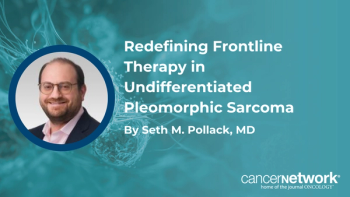
KN026/Chemotherapy Meets PFS End Point in HER2+ Gastric Cancer in 2L Setting
Results from the phase 2/3 trial also show a favorable OS trend for KN026 with chemotherapy vs placebo with chemotherapy in HER2-positive gastric cancer.
KN026, an anti-HER2 bispecific antibody, administered with chemotherapy met the prespecified primary end point of progression-free survival (PFS) with statistical significance and clinical relevance in the second-line or above treatment of patients with HER2-positive gastric cancer, according to a press release from the developers, Alphamab Oncology and CSPC Pharmaceutical Group.1
The results came from the randomized, multicenter phase 2/3 KN026-001 trial (NCT05427383) that evaluated the efficacy of KN026 combined with chemotherapy in patients with HER2-positive advanced, unresectable, or metastatic gastric cancer who progressed on prior first-line therapy.
The interim analysis also showed that KN026 with chemotherapy significantly improved PFS vs the current standard-of-care treatment while demonstrating a trend toward overall survival (OS) benefit.
In the second part of the trial, patients were randomly assigned, in a 1:1 ratio, to receive either KNO26 with chemotherapy or placebo with chemotherapy.
Further data from the trial will be shared at an upcoming international academic conference.
Eligible patients were 18 years or older with histologically or cytologically confirmed HER2-positive gastric cancer who progressed on a first-line therapy regimen including trastuzumab (Herceptin).2 Additional eligibility criteria included an ECOG performance status of 0 or 1, a life expectancy of 3 months or greater, and adequate organ function.
Those with untreated active brain metastases, receipt of investigational medicines within 4 weeks of first study dose, receipt of major surgery within 28 days of first study treatment, prior use of anti-HER2 therapy other than trastuzumab, and poorly controlled systemic diseases as judged by investigators were excluded from trial participation.
Study treatment consisted of intravenous KN026 at 30 mg/kg on day 1 every 3 weeks, intravenous paclitaxel at 175 mg/m2 on day 1 every 3 weeks, intravenous docetaxel at 75 mg/m2 on day 1 every 3 weeks, and intravenous irinotecan at 125 mg/m2 on days 1 and 8 every 3 weeks. In the comparator arm, KN026 was replaced with matching placebo.
The trial’s primary end points were PFS and OS per RECIST v1.1 criteria, both by independent review committee (IRC) assessment. Secondary end points were overall response rate (ORR) by investigator’s assessment and IRC, disease control rate (DCR), duration of response (DOR), and safety.
Additionally, results from the trial were presented at the
At the data cutoff of March 26, 2024, by IRC, the confirmed ORR was 40.0% (95% CI, 23.9%-57.9%), with 14 partial responses (PRs), and the DCR was 80.0% (95% CI, 63.1%-91.6%), with 8 cases of stable disease (SD). By investigator assessment, the ORR was 45.9% (95% CI, 29.5%-63.1%), with 17 PRs, and the DCR was 81.1% (95% CI, 64.8%-92.0%), with 13 cases of SD.
The median times to response and DOR were 1.38 months (IQR, 1.38-1.45) and 11.7 months (95% CI, 5.98-not applicable), respectively. The median PFS was 8.6 months (95% CI, 3.78-13.11), and the median OS was 13.2 months (95% CI, 10.58-20.53).
Regarding safety, the most common treatment-related adverse events of grade 3 or higher included neutropenia (33.3%), diarrhea (7.7%), lymphocytopenia (5.1%), febrile neutropenia (5.1%), hypokalemia (5.1%), and cough (5.1%). The authors noted that no new safety signals were identified.
A total of 39 patients were enrolled at data cutoff. The median age was 59 years (range, 34-78), and HER 3+ staining was observed in 34 (87.2%) patients; response evaluation by IRC and investigators was available for 35 patients and 37 patients, respectively.
References
- A pivotal phase II/III clinical study of anti-HER2 bispecific antibody KN026 have met the primary endpoint of PFS at interim analysis. News release. Alphamab Oncology and CSPC Pharmaceutical Group. May 1, 2025. Accessed May 1, 2025. https://tinyurl.com/38uvf3sp
- KN026 in combination with chemotherapy in HER2 positive gastric cancer subjects who have failed first-line therapy. ClinicalTrials.gov. Updated December 19, 2023. Accessed May 1, 2025. https://tinyurl.com/ywj6xsaj
- Xu J, Zhao J, Chen Y, et al. Efficacy and safety of KN026 in combination with chemotherapy in patients (pts) with unresectable or metastatic HER2 positive gastric or gastroesophageal cancers (GC/GEJC) after first-line treatment with a trastuzumab-containing regimen. Ann Oncol. 2024;35(suppl 2):S889. doi:10.1016/j.annonc.2024.08.1491
Newsletter
Stay up to date on recent advances in the multidisciplinary approach to cancer.












































